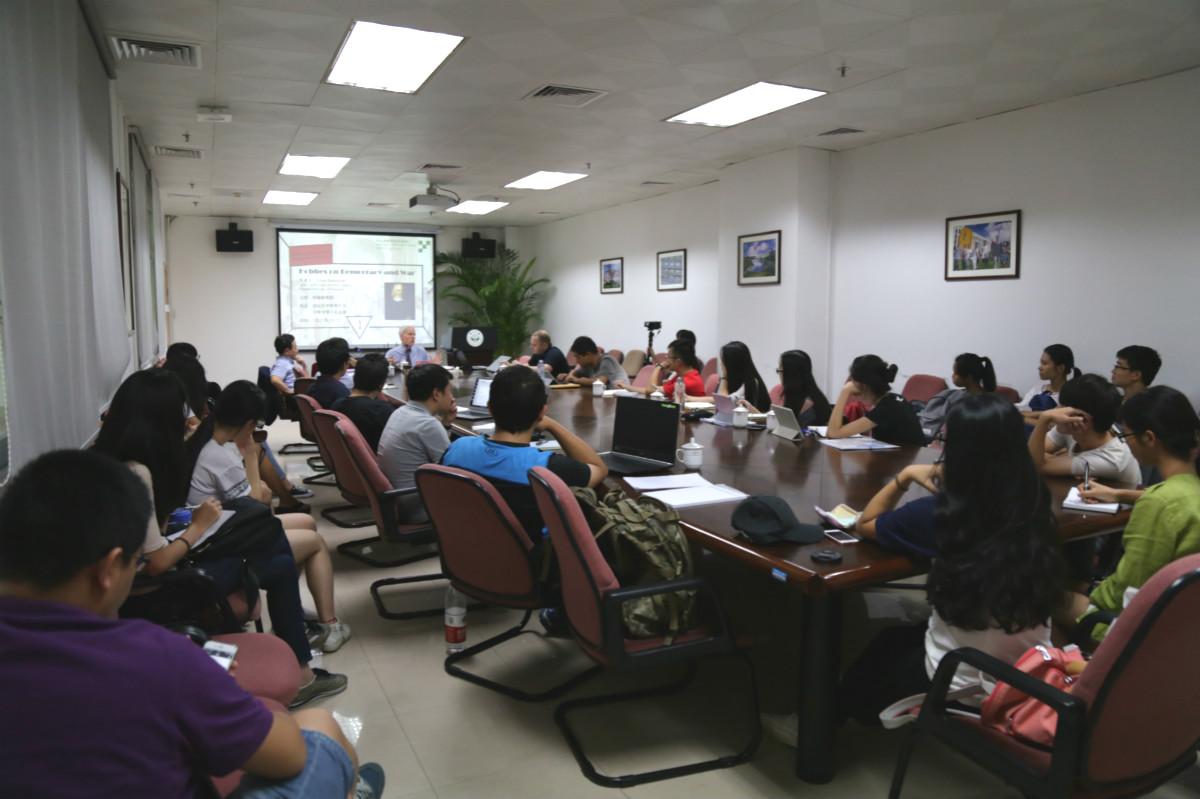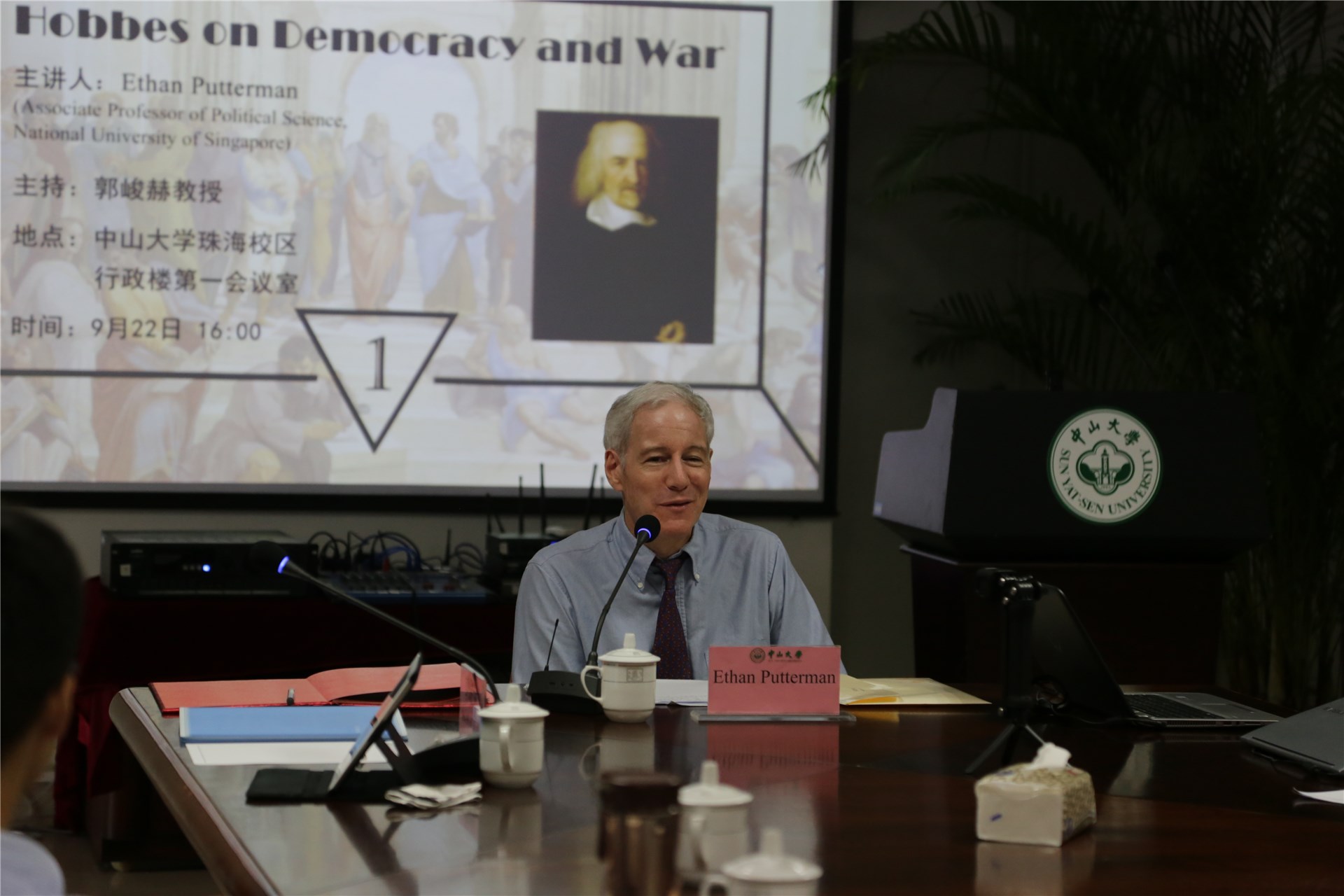Political Philosophy Workshop:Hobbes on Democracy and War
2016年9月22日下午4:00—5:30哲学系(珠海)Political Philosophy Workshop在行政楼第一会议室顺利举行。
会议由我系郭峻赫教授(Jun-Hyeok Kwak)主持,来自新加坡国立大学的Ethan Putterman教授开启该论坛的第一讲,主题为:Hobbes on Democracy and War。
研讨会初始,Putterman教授首先九关于霍布斯经典政治哲学在学术史上的相关争论进行了梳理,并且针对民主制度和战争之间的关系发表了自己的见解。从如何在当下理解霍布斯的政治哲学到我们应该如何应对新时代的强权政治,Putterman教授都提出了很多极具建设性的看法。
在Putterman教授发言之后,我系研究员Dr. Tim Beaumont 对其论文进行了总结,并提出一系列对于Putterman教授观点的疑问。随后,参加研讨会的师生纷纷加入讨论,就Putterman教授的论文以及当下美国政治实践提出了问题。
最后,郭峻赫教授对本次研讨会做了小结,哲学系(珠海)政治哲学研讨会第一讲圆满结束。哲学系(珠海)政治哲学研讨会是本系的常规项目,旨在通过邀请国际知名政治哲学学者与教授前来本系讲学讨论,形成良好的学术交流与争辩的氛围。研讨会的顺利开展,将有助于提升哲学系(珠海)的国际化与学科专业化。

On Thursday 22 September, 2016, Professor Ethan Putterman of the National University of Singapore gave the inaugural presentation of Political Philosophy Workshop of Department of Philosophy (Zhuhai), Sun Yat-sen University, delivering a paper entitled ‘Hobbes on Democracy and War’. Professor Jun-Hyeok Kwak of the Department of Philosophy (Zhuhai) initiated the meeting by setting out the aims of the workshop. It will be open to scholars from around the world as well as Sun Yat-sen faculty, providing them with an opportunity to present their research in all areas of political philosophy and political theory, including historical studies, contemporary theory, and applications thereof. Having set out the aims of the workshop, Professor Kwak then turned to introducing Professor Putterman as an eminent political theorist and Rousseau scholar, who is now transitioning into Hobbes studies as part of his research project on the role of social psychology in early modern social contract theory.
Professor Putterman began his talk by noting that, while Hobbes has traditionally been viewed as an opponent of democracy, there is a growing revisionist movement of Hobbes scholars, who deny that Hobbes was completely opposed to democracy, and may even have been sympathetic to it. Professor Putterman suggested that, given the recent rise of authoritarian personalities within western democracies, one danger of the revisionist movement is that it will blind us to Hobbes’ warnings about the way in which democracy can empower orators who flatter the mass, on the one hand, while engaging in demagoguery and war-mongering, on the other.
Professor Putterman did not deny the existence of a textual basis for the revisionist interpretation but maintained that it was outweighed by other textual sources, on the one hand, and can be explained away in terms of Hobbes’ desire to win-over supporters of parliamentary politics and ancient democracy to his conception of absolute and undivided sovereignty, on the other. Professor Putterman maintained that once the evidence is fully weighed, the most reasonable interpretation to be drawn is not just that the revisionist reading is inaccurate, but that even the traditional reading underestimates the extent of Hobbes’ opposition to democracy.
In the role of respondent, Dr. Tim Beaumont of Department of Philosophy (Zhuhai) noted the importance of distinguishing between evidence that Hobbes did not really believe the statements in which he appears to suggest that democracy can be a viable form of government, and evidence that he is logically committed to rejecting democracy regardless of whether he realized this or not. Dr Beaumont also questioned whether Professor Putterman’s textual evidence, purporting to show that Hobbes believed that monarchy is a far more stable and effective form of government than democracy, was sufficient to establish the conclusion that Hobbes took democracy to be a completely lost cause.
Following this exchange, Professor Putterman took a wide-range of questions from an audience consisting of students and faculty members. This led to an extremely interesting discussion, in which Sun Yat-sen graduate students with an interest in Hobbes were provided with the opportunity to interact with a world-class specialist in their field of enquiry. Department of Philosophy (Zhuhai), Sun-Yat sen University is extremely grateful for Professor Putterman’s enlightening talk and his participation in our inaugural workshop. As we build on this initial success, we hope to turn our new department into one of Asia’s largest centers for research in political philosophy, and make Sun Yat-sen University a major port of call for scholars wishing to exchange ideas.



